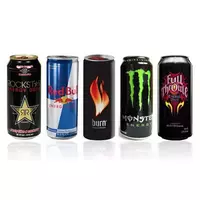Energy drinks

Energy drinks, energy pots or power engineers have long settled in the global drinking tradition. At its core, energy drinks are low-alcohol or drinks that do not contain an alcoholic component at all. Due to its distinctive properties, energy drinks are able to influence the central nervous system of the human body.
Composition of energy drinks
Substances included in the chemical composition of energy drinks have an anti-sedative effect. As a rule, energy drinks contain compounds such as caffeine, as well as stimulants and sources of carbohydrates. Most often, stimulants such as theobromine and cocoa alkaloid theophylline are used to produce energy drinks.
Glucose as well as sucrose are used as carbohydrate sources. Often taurine is found in the composition of power engineers. The calorie content of energy drinks, however, as well as other significant characteristics, depend primarily on the composition and type of product. However, as a rule, the average caloric content of energy drinks is at 49 Kcal, which are contained in 100 grams of the product.
Types of energy drinks
All types of energy drinks are highly carbonated products and contain a large amount of carbonic acid in their chemical composition. It turns out that carbonic acid helps to significantly speed up the processes of absorption by the human body of all biologically active components included in energy drinks.
Interestingly, people began to use the first types of energy drinks at the initial stage of the development of human civilization. However, those ancient energy drinks belonged to the so-called stimulants of natural or natural origin. As power engineers, certain varieties of tea, coffee, as well as herbs, such as ginseng, aralia, coca leaves and ephedra, were used.
Numerous types of energy drinks are divided into three main groups:
stimulants or energetics that contain caffeine in their chemical composition;
sports energy drinks are used to replenish the energy of working muscles;
vitaminized energy drinks.
The benefits of energy drinks
The debate about the harms and benefits of energy drinks has not subsided since the invention of the product. Modern food manufacturers assure that there is a benefit from energy drinks for the human body. for example, just one can of a vitamin energy drink can contain the daily intake of all the vitamins necessary for a man.
In addition, the composition of power engineers contains even less caffeine than in the same volume of coffee. Energy drinks stimulate the human body and reveal hidden reserves that help significantly increase performance and productivity. However, the stimulating and invigorating effect of power engineers does not last long.
The harms of energy drinks
Doctors argue that the harm of energy drinks lies in the mechanism of influence on the human body of the substances included in the product. The main harm of energy drinks is caused to the nervous system, as well as to the metabolic processes of the human body. For this reason, it is worth completely excluding energy from the diet of children, and for adults to limit the drink consumption rate to one can per day.
energy drinks 49 kCal
Energy value of energy drinks (Ratio of proteins, fats, carbohydrates - ju):
Proteins: 0 g (~ 0 kCal)
Fats: 0 g (~ 0 kCal)
Carbohydrates: 11.6 g (~ 46 kCal)
Energy ratio (bj | y): 0% | 0% | 95%
 Español
Español Français
Français Português
Português Русский
Русский 简体中文
简体中文 繁體中文
繁體中文 日本語
日本語 한국어
한국어 العربية
العربية Türkçe
Türkçe Қазақ
Қазақ Deutsch
Deutsch Italiano
Italiano Українська
Українська
